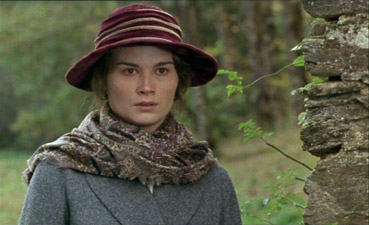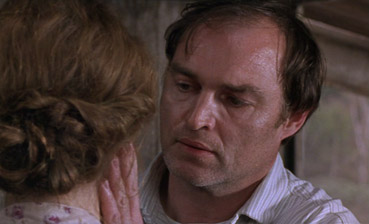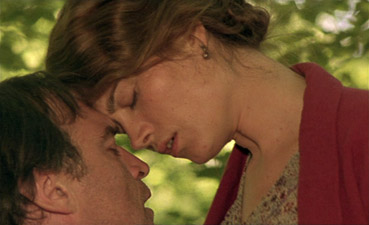|
OK, confession time. I've never actually read D.H. Lawrence's censor-baiting classic Lady Chatterley's Lover. I know this sets me up for brickbats from those who know the book well, many of whom will no doubt wonder how I can possibly be qualified to talk about a film based on it. In terms of its accuracy to the written word they have a damned good point – I can't swear to any of it, despite my knowledge of the story itself through friends who have read it, the numerous articles I've encountered about it and its author, the notorious court case to ban it in the UK, and the previous film and TV adaptations I've been exposed to. Given all that, I'm starting to wonder how the hell I've sidestepped the book itself for so long.
In my partial defence as a reviewer I will say that I watched this particular incarnation with someone who knows the novel well and who provided me a running commentary on how how film fared as an accurate adaptation. But I would also like to point out that this is a film and not a reprint of the book, and thus has to stand on its own merits. There's no doubt that a knowledge of the source material for any adapted film can bring its own specific pleasures or, as is more often the case, irritations. But I can't believe that any filmmaker adapting a literary work can really have expected everyone who watches it to have read the book it's taken from in preparation. Oh, and there's just one more thing in the case of this particular film adaptation – despite outward appearances, the source novel is actually not Lady Chatterley's Lover, but John Thomas and Lady Jane, a far less widely read version of the same tale, written by Lawrence and published in 1927, a year before its more famous counterpart hit the stores.
For those new to the story – and there must be some – a quick summary. It's 1920 England. Lady Constance Chatterley lives in the stately home of Wragby Hall with her wealthy husband Clifford, who was paralysed and left impotent in the First World War. Constance develops a fascination for the estate's gamekeeper (Oliver Mellors in the later book, Parkin here), and despite his initial hestitance at her forwardness, the two become sexually involved and embark on an increasingly passionate affair. Although there are later story strands involving a possible pregnancy, a trip to Europe and Constance's relationship to Clifford, it's the affair and particularly the effect it has on Constance that remains the story's raison d'être. Not much plot for a close-to three hour film, you might think.

Although the story is most widely known for its sexual content, the most striking aspect of this take on the tale is its refusal to sensationalise and its disarming sense of the ordinary and everyday, with the mundane routine of Constance's life and her almost formal relationship to Clifford economically established in a few short, almost wordless scenes. Her first furtive glimpse of Parkin washing his upper body clearly sparks something in her, but there is no high drama to this moment, no explosive awakening of buried sexual frustration, just a woman who has seen something she did not expect. And although a bit embarrassed she is also a little curious, and as she sits and contemplates what she has seen she finds that she is also just a little turned on.
Director Pascale Ferran strips the developing affair of any hint gloss or glamour and in the process renders it real. Thus the relationship begins much as relationships often do – hesitantly, uncertainly, but edged steadily forward by an underlying longing and desire. In the casting of Jean-Louis Coulloc'h as a somewhat hulking and not obviously attractive Parkin, Ferran also kicks against previous film incarnations, whose gamekeepers were often good-looking enough to tempt even the most happily married and sexually satisfied women to stray from the path of monogamy. It's a recognition that Constance's desire is more complex than one driven by a schoolgirl-like attraction to movie-star looks, and a prompt for us as viewers to look a little deeper for an appreciation of her motivation.
The film takes a similarly matter-of-fact approach to nudity, which although inevitably present never for a second feels gratuitous or thrown in for titillation. An early bedroom disrobing by Constance might initially prompt an inward groan of "here we go..." but it's quickly revealed that her purpose in doing so is to regard her reflection following her first encounter with the topless Parkin, a moment of insecurity about her own physical attractiveness. The sex scenes may at first seem a little coy, staged as they are with the characters fully clothed and with the camera rarely straying too far below the shoulders, but there is purpose to this approach, focussing our attention on sex as an experience rather than a physical act, and the development of the sexual relationship between Constance and Parkin becomes as important as their growing emotional bond. For Constance, their first fuck (a term I use in the spirit of the author and because it is absolutely appropriate term for what takes place) appears to excite her curiosity more than her body – the gasping and groaning is all Parkin's and the whole thing is over almost before it's begun. But she's soon back for more and with each encounter her sexual fulfilment increases, culminating in a her-on-top woodland coupling that concludes in simultaneous orgasm and the very real sense that they are now on a sexual par. The subsequent nudity thus occurs only when it figures logically in the relationship itself, as the two become more at ease with and openly curious about each other's bodies. By the time they are running joyfully and naked in the rain, we are as comfortable with their nakedness as they are.

It's this sense that Constance and Parkin are as real as you or I that makes them so easy to engage with and relate to (unless, of course, you are outraged by the very idea of extramarital affairs, in which case this is probably not the story for you). It also infuses an old story with a present-day sensibility without tripping down the post-modernist route, unless you count the home-movie representation of Constance's trip to France. The film is not without its symbolism or romanticism, however, with nature in all its guises presented prominently and evocatively enough to join the couple in a spiritual ménages-à-trois, but in a manner that always feels organic to the setting and atmosphere of the piece.
I was surprised by just how caught up I was Lady Chatterley and how involved I became with the characters and their developing affair. It helps immensely that both Constance and Parkin are so believable and likeable, a testament to a pair of beautifully nuanced performances by Marina Hands and Jean-Louis Coulloc'h – the thoughts and emotions of the characters are conveyed with a subtle effectiveness that at times verges on the sublime, a quality echoed by the tenderness and restraint of Pascale Ferran's time-dissolving direction.
I've been assured by my friend-in-the-know that the film is indeed faithful to its source novel, or at least what was retained in the more famous final version. I can only comment on its qualities as a film and its effectiveness as an adaptation of a work I have only seen told in cinematic terms, but in this respect Lady Chatterley genuinely leaves most of the competition standing. And yes, I've since bought copies of both books to put right this sorry gap in my literary education.
Framed 1.66:1 and anamorphically enhanced, the transfer here is a tad short of the usual Artificial Eye standard. Although clean and boasting very reasonable level of detail, the picture is a little on the soft side, and the contrast range is narrower than usual for a digital transfer of a modern film. There is some grain/picture noise that is most evident in darker scenes, and there's a slight green bias to the colour in many sequences, although this may well be intentional.

Both Dolby 2.0 stereo and 5.1 surround tracks are offered but there's almost no difference between them. Music is used sparingly here, and it's the sounds of nature that are most prominent, and these are reproduced clearly and effectively mixed.
Due to the length of the film, all of the extra features are on disc 2.
Actors and Director in Conversation (31:37)
Pretty much what it claims to be, with director Pascale Ferran providing detail on how the project came about and the casting of the main roles, while actors Marina Hands, Jean-Louis Coulloc'h and Hippolyte Girardot talk about their casting and characters, and all four chip in on a detailed discussion on filming the love scenes. All are filmed separately and lit as if guesting on Most Haunted.
Deleted Scenes with Cast and Crew Commentaries (49:12)
I can't begin to tell you what's wrong with the above description of this extra feature, which I've quoted verbatim from the Extras menu. Actually, yes I can: it contains no deleted scenes, there's not really a commentary in the expected sense, and none of the cast are involved. What it does consist of are interviews with some of those involved in the production – namely the director, co-writer, cinematographer, editor, composer, sound mixer and, somewhat unexpectedly, the key grip – who each select what was for them a key scene and deconstruct it for us, outlining the content, the subtext and sometimes the technical details of its construction.
There are also Filmographies for Pascal Ferran, Marina Hands, Didier Coulloc'h and Hippolyte Girardot and a Theatrical Trailer (1:21).
A fresh, very well made and captivatingly performed take on a not so well-read version of a world-famous novel of awakening passion, handled here with tenderness, a welcome sense of relationship equality and a positive attitude to the characters and their affair. It certainly hit a nerve in its native France, where cleand up at the 2006 César Awards, bagging five of the top gongs, including Best Film and Best Actress, and landing nominations for a further four. Artificial Eye's 2-disc set has a couple of informative if visually unflattering extra features, but loses a couple of points for a slightly below par transfer. Although I'd be interested to see the 220 minute French TV version, I've no complaints about its absence here, as the theatrical cut flows well enough and for what feels just the right length.
|